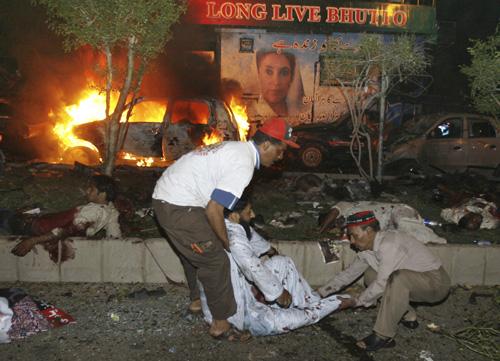Bombing in Pakistan kills 126

October 19, 2007
KARACHI, Pakistan – A suicide bombing in a crowd welcoming former Prime Minister Benazir Bhutto killed at least 126 people Thursday night, shattering her celebratory procession through Pakistan’s biggest city after eight years in exile.
Two explosions went off near a truck carrying Bhutto, but police and officials of her party said she was not injured and was hurried to her house. An Associated Press photo showed a dazed-looking Bhutto being helped away.
Officials at six hospitals in Karachi reported 126 dead and 248 wounded. It was believed to be the deadliest bomb attack in Pakistan’s history.
Bhutto flew home to lead her Pakistan People’s Party in January parliamentary elections, drawing cheers from supporters massed in a sea of the party’s red, green and black flags. The police chief said 150,000 were in the streets, while other onlookers estimated twice that.
The throngs reflected Bhutto’s enduring political clout, but she has made enemies of Islamic militants by taking a pro-U.S. line and negotiating a possible political alliance with Pakistan’s military ruler, President Gen. Pervez Musharraf.
Get The Daily Illini in your inbox!
An estimated 20,000 security officers had been deployed to protect Bhutto and her cavalcade of motorized rickshaws, colorful buses, cars and motorcycles in the streets of Pakistan’s largest city.
Authorities had urged Bhutto to use a helicopter to reduce the risk of attack amid threats from extremists sympathetic to the Taliban and al-Qaida, but she brushed off the concerns.
“I am not scared. I am thinking of my mission,” she had told reporters on the plane from Dubai. “This is a movement for democracy because we are under threat from extremists and militants.”
Last month, Bhutto told CNN she realized she was a target. Islamic militants, she said, “don’t believe in women governing nations, so they will try to plot against me, but these are risks that must be taken. I’m prepared to take them.”
Leaving the airport, Bhutto refused to use a bulletproof glass cubicle that had been built atop the truck taking her to the tomb of Pakistan’s founding father, Mohammed Ali Jinnah, to give a speech. She squeezed between other party officials along a railing at the front and rode high above the street.
Her procession had been creeping toward the center of Karachi for 10 hours, moving at a snail’s pace while dancing and cheering supporters swarmed around the truck, when a small explosion erupted near the front of the vehicle.
That was quickly followed by a larger blast just a few feet from the truck, setting an escorting police van on fire and breaking windows in Bhutto’s vehicle. Party members on top of the truck scrambled to the ground, one man jumping while others climbed down a ladder or over the side.
Christina Lamb, Bhutto’s biographer, said the former premier had just gone to a downstairs compartment in the truck for a rest when the blast went off.
“She knew she was a target, I was talking to her about it … she was worried that the lights were going off, the street lights, and that snipers could be on tops of buildings and bridges,” Lamb told the Associated Press. “Luckily the bus had a downstairs enclosed compartment for her to go and rest in, and she just happened to be there when it went off.”
Associated Press writers Ashraf Khan, Sadaqat Jan and Zarar Khan and Sarah DiLorenzo contributed to this report






